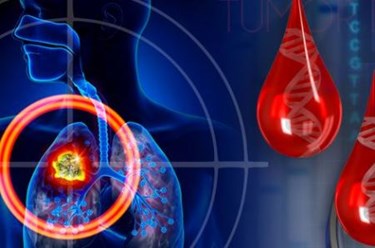Pathway Genomics Launches First Liquid Biopsy

Pathway Genomics has announced the commercial launch of CancerIntercept, a simple blood test the company claims can detect tumor growth in asymptomatic patients who are at high-risk of developing cancer. While many believe that less-invasive liquid biopsies will be the future of cancer diagnostics, many experts worry that CancerIntercept lacks the necessary clinical data to support all of its claims.
Current methods of detecting cancer require sophisticated imaging techniques and surgical biopsies. In addition to being expensive and oftentimes painful, these methods are only effective in detecting cancers that have grown enough to be visible or symptomatic, which is often too late for effective treatment of more aggressive varieties of the disease. Now scientists believe that cancer could be detected sooner by looking for certain DNA markers in the blood.
Cowen & Co, a financial services company, estimates that DNA-based blood tests for cancer detection and monitoring will be worth $10 billion by the end of the decade, and Reuters reports that Roche-backed Foundation Medicine, Genomic Health, Illuminia, and Sequenom, as well as top academic research institutions nationwide have a “liquid biopsy” in the works.
Pathway Genomics is the first company to launch a product, which it says can identify 96 somatic mutations that occur in nine genes associated with cancer: BRAF, CTNNB1, EGFR, FOXL2, GNAS, KRAS, NRAS, PIK3CA, and TP53. By scouring blood samples for these mutations, CancerIntercept may enable oncologists to get a jump on treatments for colorectal, breast, ovarian, and lung cancers, as well as melanoma, before a patient experiences symptoms.
“Early detection is the single most important factor in ensuring successful treatments and improved survival rates,” said Jim Plant, Pathway Genomics founder and CEO, in a press release. “Cancer patients and those at risk for the disease can take proactive steps to safeguard their health and fight back against some of the most virulent forms of the disease.”
In an interview with GenomeWeb, Andy Arianpour, chief commercial officer for Pathway Genomics, explained that the test would be available through a doctor’s office or the company’s website, but positive results would always be communicated by a counseling primary care physician, indicated by the patient on their online submission form.
News of CancerIntercept’s launch has been the subject of criticism by many in the oncology research community who complain that the privately-funded Pathway Genomics lacks peer-reviewed clinical data to support its claims, and its liquid biopsy might do more harm than good.
Keith Stewart, an oncologist at the Mayo Clinic, told Reuters, “For any given test, the rate of false positives causing unnecessary alarm and false negatives that provide false security should be known.”
According to The Verge and MIT Technology Review, the veracity of Pathway Genomic’s claims cannot be verified until more clinical testing is completed. While CancerIntercept may be 99 percent effective in detecting mutations, Pathway Genomics has no data that proves these mutations appear as early as they claim, and these markers are not always a guaranteed sign of imminent cancer growth and spread.
While spokespeople for Pathway Genomics fully admit the bulk of their research has studied patients who already have advanced cancers, Plante told Reuters that two large clinical studies are underway, and he expects the results to make their way into peer-reviewed literature.
The Verge reported that the FDA is working on revising regulations that would require these tests to be approved before entering the market, but for right now, DNA-based cancer diagnostics are in a “regulatory blind spot.”
